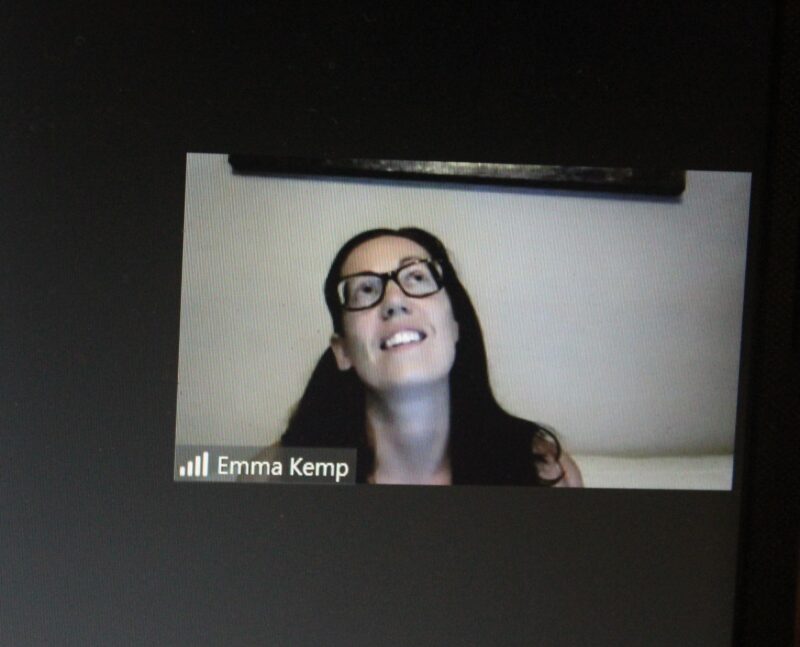INTERVIEW: FIRE & DUST MEETS EMMA KEMP
“Revelation’s detonation –
at least until the renewal of things – gashes small,
late in the day, stirred blue embers startling.
I find if I take one book from the shelf, all the others will fall”
_________________________– from ‘On discovering the poetry of Robert Siegel’)
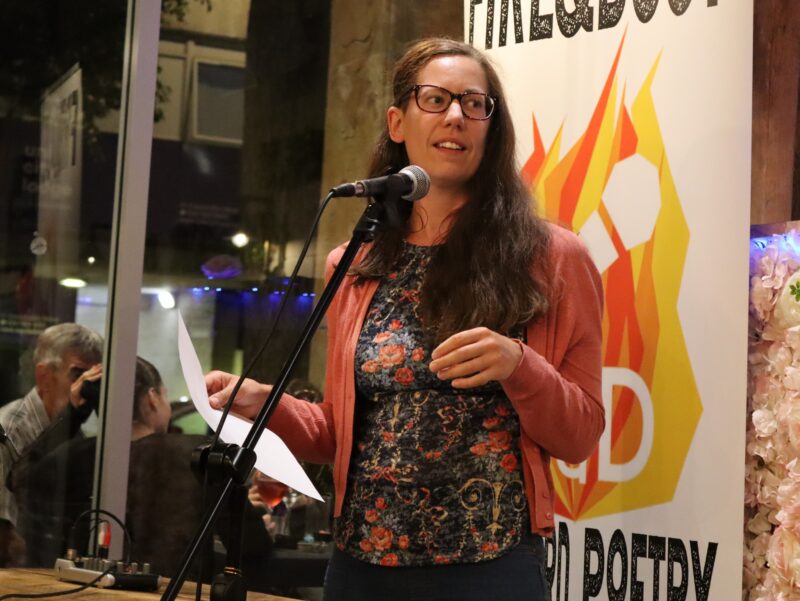
Coventry-based poet Emma Kemp has had work published in magazines and journals including Transpositions, Ekstasis, The Rialto and Iamb. Her poem ‘Phoenix’ was the inaugural winner of Theatre Absolute’s Pillar Poetry competition. Emma is the rep for Cov Stanza group, and loves being part of poets’ journeys of development and self-discovery. She is currently using poetry to explore themes of loss, transition and identity.
Emma headlined for our international Fire&Dust gig via Zoom on 11th August 2022. Her set was well-received by the crowd, and we caught up with her after the gig, to ask a few questions…
HCE: Tell us a little about your background and journey as a writer so far. What inspired you to start creating and then performing poetry?
EK: I have loved poetry since school – I am one of the rare people who actually enjoyed pulling a poem to pieces and analysing it in lessons. I first started writing poetry when I was an English Literature student at university. Initially, I wrote more as a form of prayer than anything else, and as a way of making sense of my spiritual experience. Later, I started writing more generally and decided to go along to a poetry group – Brum Stanza, which was then being led by Roz Goddard. It was a space where we were encouraged to work on and have ambitions for our poetry, and it was the first place I ever performed a poem in front of an audience. I later discovered the poetry scene in Coventry (it wasn’t easy! I was actively trying to connect with poetry events and failing), eventually turned up at Fire and Dust and the rest is history!
HCE: Would you say there are themes or motifs that you tend to gravitate to in your writing overall?
EK: I’ve always written a lot of poetry with spiritual themes, but as my beliefs have evolved that’s no longer the case. I guess I tend to write about people and relationships predominantly, often with reference to the natural world. I use my writing to help me make sense of my own experiences, hence the current focus on loss, transition and identity – because those are subjects which have been dominating my experience of being in the world.
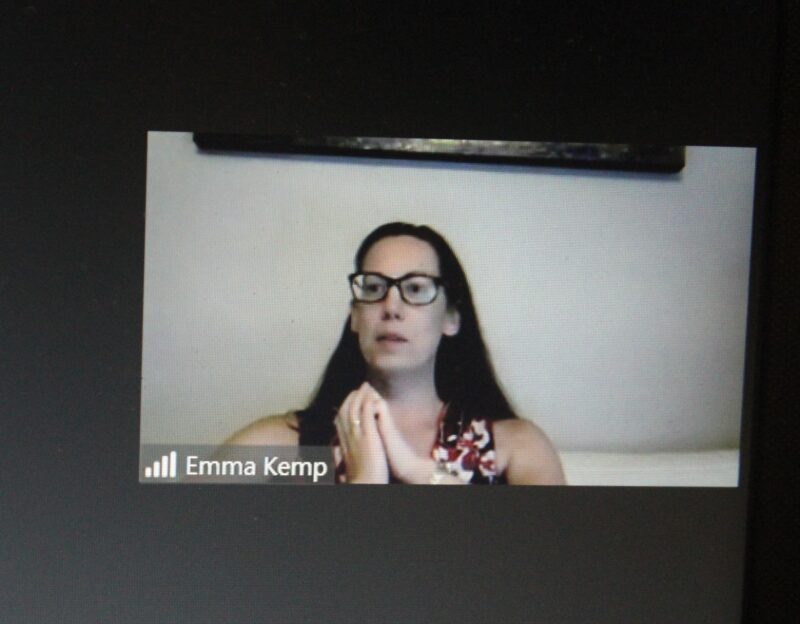
HCE: Who is your work aimed at – do you have an ideal audience in mind when you’re putting a poem together?
EK: That’s a tricky question. Ideally, I don’t have an audience in mind – I write for myself. However, that’s not always strictly true. For example, there are certain poems I think will appeal to F&D regulars that I wouldn’t necessarily submit to journals or competitions. I think I need to edit the audience out of some of my poetry to stay true to my own voice, if that makes any sense!
HCE: Much of your recent poetry deals with subject matter like personal growth and journeys, in a direct and honest way. Is this an emotionally draining thing to do? What is the top piece of advice you would give other poets for tackling heavy/raw topics in their writing?
EK: I don’t find it emotionally draining – the opposite is true for me. When I’m going through experiences that I find difficult to make sense of, poetry helps me find some meaning in those experiences. The fact of being able to give authentic expression to something – no matter how awful it was at the time – helps me to integrate it into my understanding of myself and move forward. I suppose my advice would be to write with the emotions you are experiencing, rather than forcing yourself to go back to heavy that you’re not ready to process. How can you put into words and images what you are encountering in your body at the moment when emotions are arising?
HCE: Do you most enjoy sharing your own poetry on paper or in performance? Do you feel there is a distinction between writing for the page and for the stage?
EK: I enjoy performing on a stage, but I do really write for the page primarily. As I mentioned in my F&D set, I find it hard to take information in aurally, so poetry-as-performance is not my favourite way to encounter it. (I know! Sorry!)
I like the way a poem on a page invites the reader to stay with it, to realise the clever things the poem is doing with language and structure and metaphor. Often some of those techniques are really subtle and don’t come across in performance. Having said that, there are some spoken word performers who are class acts and can captivate my attention – people like Luke Wright and Hollie McNish, and some F&D regulars who I won’t name for fear of leaving others out.
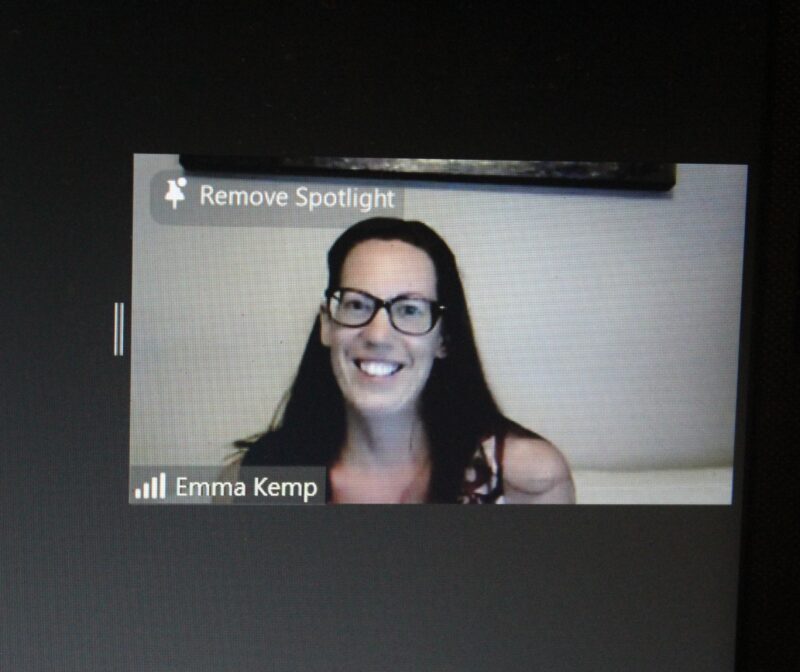
HCE: How long has the Cov Stanza group been going, and what sort of stuff do you all get up to? For any local poets reading this who’d like to join – where should they go to seek more information?
EK: Cov Stanza, established 2019, it says on our Facebook group!
Early that year, I was feeling sad about the demise of Brum Stanza (since given rebirth by Lorraine Dixon) and really wanted something similar in Coventry. I gathered a small group of local Poetry Society members who were interested, and we became the founding members.
Our core activity is our monthly meetings on the 4th Thursday of the month from 7.30-9.30pm at our new home, The Old Windmill in Spon Street. During the first half, someone in the group will lead us through some kind of activity – maybe a writing prompt, a conversation about a poem or an introduction to a topic. Then in the second half, anyone who wants to can bring a poem they’re working on, to get feedback.
We also periodically run Submission Café, which is a 2 hour slot set aside to work on poetry submissions to magazines, journals and other publishers. A number of our members find it helpful to carve out this time, as it can be hard to get round to editing and sending work off.
Another activity we’ve done a couple of times is 52: those who want to split up into little accountability groups to work through Jo Bell’s weekly writing prompts for a full year. Each week, group members submit their poems to each other for feedback. It’s a great way to hold yourself accountable to writing regularly.
We’re officially relaunching Stanza on Thursday 22nd September, so if you love poetry and want to continually improve your writing, please get in touch and join us!
HCE: In your experience, is Coventry a good place to be a poet, with a thriving literary scene? Has its status as City of Culture 2021 resulted in a sustainable legacy of resources for local writers?
EK: You don’t just ask the easy questions, do you, Raef? Coventry is my poetic home. It’s where I learned loads from my tutors at Warwick Uni (especially Emma Mason, who I am forever indebted to and is now Head of the English Department) and it’s where I have met a whole bunch of poets who I value, many of whom I count as friends. Do I think Coventry has a thriving literary scene? I think it’s improving all the time. We’ve got our own Poet Laureates, we’ve had poetry festivals and regular events. I would love there to be more opportunities for writers with different styles and voices to come and share their work. I’d also love there to be a regular slam (not that I would ever compete, but I enjoy being in the audience!)
I don’t think I can say whether City of Culture has left a sustainable legacy of resources yet. I’m inclined to say that the literary scene in the city is a very grassroots movement and remains so, but it can’t have hurt to have high-profile events like BBC Contains Strong Language showcasing Coventry.
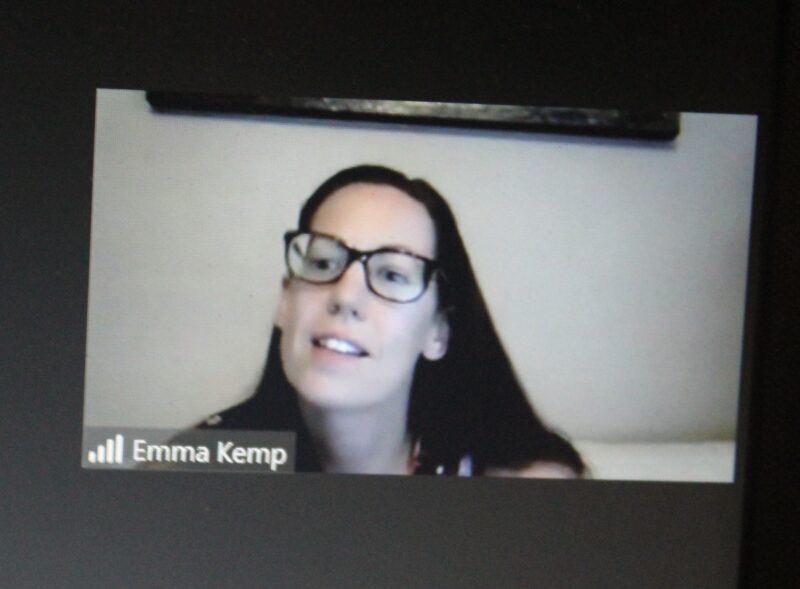
HCE: What type of poetry do you seek out for personal enjoyment? As a reader/listener, when you engage with a poet’s work, what are you hoping to get out of it?
EK: Great question, and almost impossible to answer. I like poetry that makes me feel something, that puts across the human experience in a way I couldn’t have thought of myself, but resonates with me deeply. I’ve written poetry in response to a diverse range of poets like Day Mattar (“Liverpool’s resident non-binary, nudey-rudey, shiny-whiny poet”), Jane Kenyon (an American poet who has been compared to Keats) and Robert Siegel (and you’ll know about that if you came to my F&D set). I enjoy a lot of 20th century writing by people you might expect, like Gerard Manley Hopkins, Sylvia Plath, W H Auden, Seamus Heaney (not enough women in that list…)
In terms of contemporary poetry, I often pick up on individual poems I like, in journals etc, but don’t always seek out the poet’s full collection. There are some collections I love and go back to, though: Wayne Holloway-Smith’s Alarum, Karen Mccarthy Woolf’s An Aviary of Small Birds and Pádraig Ó Tuama’s Readings from the Book of Exile being some of them.
HCE: Do you have a top piece of writing advice you could share with our readers?
EK: I have two pieces of advice, and neither of them are earth-shattering. First off, read. I don’t care how many other people have said it, you are not going to write good poetry unless you read good poetry, and you are not going to write relevant, contemporary poetry unless you read relevant contemporary poets. Secondly, write. It’s not an easy thing to do if the majority of your life is consumed by other responsibilities, so you might need to find ways to discipline yourself. 52 has been particularly great for me, but even being part of Stanza and knowing I will have that monthly opportunity to get feedback on my work is a good driver to actually produce something.
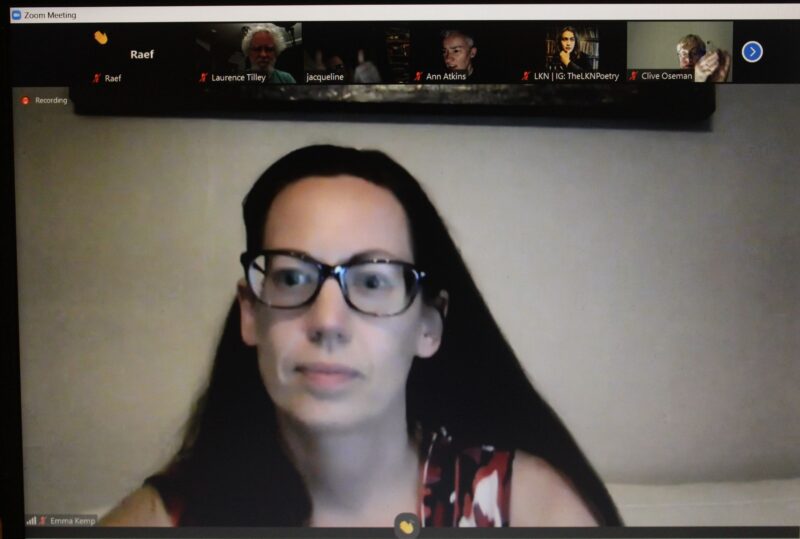
HCE: What’s next on the horizon for you?
EK: I think in all likelihood I’ll be retreating into a fairly quiet, reflective space for the time being. I’ve had a lot to process and that has come out in my writing in fairly haphazard ways that don’t necessarily have a coherent style or voice. I need to take time to go back over my work, edit, figure out which pieces of writing I want to allow to be public and to speak for this stage in my life.
HCE: What’s the best way for people to keep connected with you and your work, or contact you for bookings?
Self-promotion doesn’t come easy and I’m pretty quiet out there, so you will need to connect with me in person if you want to keep up to date with my work. Come and join Stanza! I am on Twitter, but I mainly watch from the sidelines (which I would highly recommend, by the way, you do get a good sense of what is going on in the UK poetry scene).
Emma on Twitter Emma’s ‘Iamb’ page Cov Stanza on Facebook
